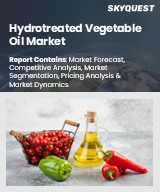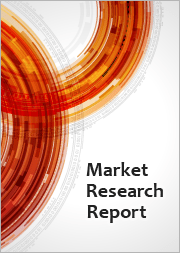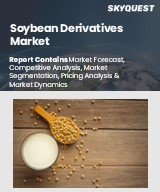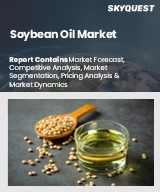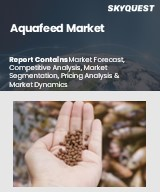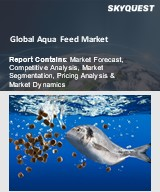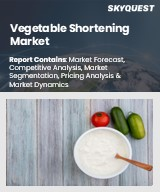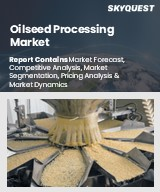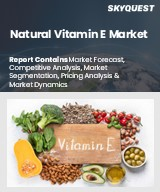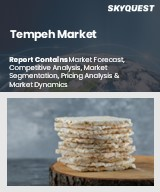
|
시장보고서
상품코드
1627797
비유전자변형 대두 시장 : 예측(2025-2030년)Global Non-GMO Soybean Market - Forecasts from 2025 to 2030 |
||||||
세계의 비유전자변형 대두 시장은 예측 기간 동안 3.74%의 복합 연간 성장률(CAGR)로 성장할 것으로 예측됩니다.
몇 가지 중요한 요인은 비유전자변형 대두 시장의 성장을 가속하고 있습니다. 첫 번째 촉진요인은 유전자 변형 작물과 관련된 잠재적인 건강 위험에 대한 소비자의 관심 증가입니다. 알레르겐, 항생제 내성, 사람의 건강에 대한 광범위한 영향에 대한 우려로, 많은 사람들이 비유전자변형 대두와 같은 비유전자 재조합 대체물을 적극적으로 요구하고 있습니다.
게다가 비유전자변형 대두 생산은 농약과 제초제 사용량 감소, 생물다양성 촉진 등 보다 지속가능한 농법과 관련이 많습니다. 게다가 유전자 재조합 제품의 사용 제한이나 전면 금지를 실시하고 있는 국가도 있기 때문에 비유전자변형 대두 생산자에게는 유리한 수출 기회가 발생해 세계 시장이 확대되고 있습니다.
특히 미국은 대두의 최대 수출국 중 하나였으며 2023년 생산량은 49톤이었습니다. 미국 농무부의 추정에 따르면, 미국에서는 약 440만 에이커가 비유전자변형 대두의 재배에 적용되고 있으며, 2022년에는 대두의 총 재배면적 8,745만 5,000에이커 중 192만 4,010에이커가 비유전자변형 대두에 할당되었습니다.
또한 유전자 변형 표시 규제를 둘러싼 의식도 높아지고 있으며, 유전자 변형 제품의 표시 의무를 부과하고 있는 국가도 있습니다. 이러한 투명성의 향상은 소비자가 충분한 정보를 얻었을 때 선택하는 힘을 주어 콩과 같은 비유전자변형 옵션에 대한 수요 증가로 이어질 수 있습니다.
비유전자변형 대두 시장 성장 촉진요인
- 식물성 단백질에 대한 수요 증가는 비유전자변형 대두 시장의 확대를 촉진할 것으로 예상됩니다.
채식, 채식주의, 플렉시탈리안의 식생활을 받아들이는 소비자가 늘고 있으며, 식물성 단백질 대체품 수요의 대폭적인 상승에 박차를 가하고 있습니다. 비유전자변형 대두는 범용성과 비용 효율성이 높은 것으로 유명하며, 많은 식물성 고기 대체 식품, 유제품 대체 식품 및 기타 다양한 식품에서 매우 중요한 원료가 되고 있습니다.
유럽위원회가 최근 발표한 보고서에 따르면 EU27 지역의 대두 재배 면적은 30% 확대되었으며, 2023년 100만 헥타르에서 2035년에는 130만 헥타르에 이를 것으로 예측되고 있습니다.
보고서는 2023년부터 2035년까지 곡물에서 대두와 콩류로 EU 지역 내의 토지 이용이 현저하게 변화할 것으로 예측했습니다. 이러한 토지 이용의 변화는 사료로서의 곡물 수요의 감소, 윤작과 단백질 작물의 재배를 촉진하는 정책적 인센티브, 식물성 단백질과 현지 제품에 대한 수요 증가, 유전자 재조합이 아닌 라벨 부착 제품의 급증, 산림 파괴를 일으키지 않는 대두 생산을 목표로 하는 움직임 등 여러 요인에 의해 초래됩니다.
또한 소비자는 동물성 단백질의 섭취가 건강에 미치는 영향과 축산이 환경에 미치는 영향에 대한 우려를 우선하게 되어 있습니다. 비유전자변형 대두는 기존의 동물 유래 단백질원에 비해 보다 건강하고 지속가능한 대체 단백질원으로 인식되고 있습니다.
비유전자변형 대두 시장의 지리적 전망
지역별로 보면 시장은 북미, 남미, 유럽, 중동, 아프리카, 아시아태평양으로 구분됩니다. 미국 농부들은 상품 대두 가격의 부진, 매력적인 프리미엄, 유전자 변형 대두 종자의 비용 상승으로 비유전자변형 대두의 작제를 늘리고 있습니다. 대학의 대표자, 곡물 바이어, 대두 협회의 대표자는 모두, 비유전자변형 대두 수요가 높아지면, 비유전자변형 대두의 작성 면적은 늘어날 것이라고 말하고 있습니다. 유전자 변형 라운드 업 레이디 콩은 채용 이래 미국의 콩 제작 면적의 대부분을 차지하고 있습니다.
미국에서는 2021년에 제작된 8,720만 에이커의 대두 제작 면적 중 비유전자변형 제작 면적은 440만 에이커였습니다. 이는 2022년 추정 410만 에이커, 2020년 500만 에이커와는 대조적입니다. 미국의 대두농가는 두부, 두유, 된장, 낫토, 콩나물 등의 용도로 판매되는 식품용 대두를 약 260만 에이커 제작하고 있습니다. 나머지 170만 에이커는 사료용 콩이 차지하고 있습니다.
또한 국제 기업 시장 진출이 국내 비유전자변형 대두 수요를 더욱 높일 것으로 예상됩니다. 예를 들어 2024년 1월에는 미주리주 대두 머천다이징 협의회(Missouri Soybean Merchandising Council)와 프리미엄 기회와 다양한 유전자로 유명한 Beck's가 SOYLEIC(R) 대두의 전략적 라이선스 계약을 발표 했습니다. Beck's의 광범위한 네트워크를 활용함으로써, 이 제휴는 고올레산(HO) 부문에 이익을 주고, 대두 농가에게 HO 유전자에 대한 접근을 제공하는 SOYLEIC(R)의 목적을 완전히 보완하는 것입니다.
기존의 오일과는 대조적으로, 고올레산 대두유에는 많은 장점이 있으며 몇 가지 바람직한 특징이 있습니다. 미국산 고올레산 대두유는 지방 프로파일을 개선하고 중립적인 맛을 더하고 제품의 보존 기간을 연장하고 식품을 주역으로 합니다. 또한 식용유 중 가장 긴 비행 시간을 제공합니다. 게다가 SOYLEIC(R)은 시장에 다른 높은 올레산 대두 품종이 있는 가운데 현재 제공되는 유일한 비유전자변형 대두 품종입니다.
게다가 2022년 2월에는 식물의 유전적 다양성을 해방하는 식품기술기업인 Benson Hill, Inc.로부터 지속가능성에 특별한 이점을 가지는 국산 비유전자변형 식물성 단백질 원료의 신 라인인 TruVailTM이 발표되었습니다. TruVailTM 브랜드가 제공하는 최초의 제품은 고단백질 대두분, 대두 단백질 농축물(SPC)의 저가공 버전 및 전통적인 대두 단백질의 다양한 용도에 사용할 수 있는 텍스처화된 단백질이며, 또한 급속하게 확장하는 대체 식물성 단백질 시장에도 사용할 수 있습니다.
이 보고서를 구입하는 이유
- 인사이트 있는 분석 : 고객 부문, 정부 정책 및 사회경제 요인, 소비자 선호, 산업별 및 기타 하위 부문에 중점을 두어 주요 및 신흥 지역을 다루는 상세한 시장 고려 사항을 얻을 수 있습니다.
- 경쟁 구도 : 세계 주요 기업이 채택한 전략적 전략을 이해하고 적절한 전략으로 시장 침투 가능성을 이해할 수 있습니다.
- 시장 동향 및 촉진요인 : 동적 요인과 매우 중요한 시장 동향, 그리고 그들이 향후 시장 전개를 어떻게 형성해 나가는지를 탐구합니다.
- 실행 가능한 제안 : 역동적인 환경에서 새로운 비즈니스 스트림과 수익을 발굴하기 위한 전략적 의사 결정에 인사이트를 활용합니다.
- 폭넓은 이용자에 대응 : 신흥기업, 연구기관, 컨설턴트, 중소기업, 대기업에 유익하고 비용 효율적입니다.
어떤 용도로 사용됩니까?
업계 및 시장 인사이트, 사업 기회 평가, 제품 수요 예측, 시장 진출 전략, 지리적 확대, 설비 투자 결정, 규제 프레임워크 및 영향, 신제품 개척, 경쟁의 영향
조사 범위
- 실적 데이터 및 예측(2022-2030년)
- 성장 기회, 과제, 공급망 전망, 규제 틀, 고객 행동, 동향 분석
- 경쟁 포지셔닝, 전략, 시장 점유율 분석
- 수익 성장 및 예측 국가를 포함한 부문 및 지역 분석
- 기업 프로파일링(전략, 제품, 재무 상황, 주요 발전 등)
비유전자변형 대두 시장은 다음 부문으로 분석됩니다. :
제품별
- 분쇄 대두
- 홀빈즈
용도별
- 대두유
- 콩 밀
- 식용
- 기타
콩 형식별
- 콩단백
- 콩가루
- 대두 농축물
- 기타
지역별
- 북미
- 미국
- 캐나다
- 멕시코
- 남미
- 브라질
- 아르헨티나
- 기타
- 유럽
- 영국
- 독일
- 프랑스
- 스페인
- 기타
- 중동 및 아프리카
- 사우디아라비아
- UAE
- 이스라엘
- 기타
- 아시아태평양
- 일본
- 중국
- 인도
- 한국
- 인도네시아
- 태국
- 기타
목차
제1장 서론
- 시장 개요
- 시장의 정의
- 조사 범위
- 시장 세분화
- 통화
- 전제조건
- 기준연도 및 예측연도의 타임라인
- 이해 관계자에게 있어서의 주요 이점
제2장 조사 방법
- 조사 디자인
- 조사 과정
제3장 주요 요약
- 주요 조사 결과
- 애널리스트 보기
제4장 시장 역학
- 시장 성장 촉진요인
- 시장 성장 억제요인
- Porter's Five Forces 분석
- 업계 밸류체인 분석
제5장 세계의 비유전자변형 대두 시장 : 제품별
- 서문
- 분쇄 대두
- 홀빈즈
제6장 세계의 비유전자변형 대두 시장 : 용도별
- 서문
- 대두유
- 콩 밀
- 식용
- 기타
제7장 세계의 비유전자변형 대두 시장 : 대두 포맷별
- 서문
- 텍스처드 콩 단백질
- 콩가루
- 대두 농축물
- 기타
제8장 세계의 비유전자변형 대두 시장 : 지역별
- 서문
- 북미
- 제품별
- 용도별
- 콩 포맷별
- 국가별
- 남미
- 제품별
- 용도별
- 콩 포맷별
- 국가별
- 유럽
- 제품별
- 용도별
- 콩 포맷별
- 국가별
- 중동 및 아프리카
- 제품별
- 용도별
- 콩 포맷별
- 국가별
- 아시아태평양
- 제품별
- 용도별
- 콩 포맷별
- 국가별
제9장 경쟁 환경 및 분석
- 주요 기업 및 전략 분석
- 시장 점유율 분석
- 합병, 인수, 합의 및 콜라보레이션
- 경쟁 대시보드
제10장 기업 프로파일
- ADM
- Laura Soybeans
- Grain Millers, Inc.
- Benson hills
- Sb&B
- Zeeland Farm Services, Inc.
- Specialty Soya and Grains Alliance
- Divine Agro & Soya Food
- Montague Farms
The global non-genetically modified organisms (GMO) soybean market is anticipated to grow at a compound annual growth rate (CAGR) of 3.74% over the forecast period.
Several significant factors are driving the global non-GMO soybean market growth. A primary driver is the increasing consumer concern regarding the potential health risks associated with GMOs. Worries about allergenicity, antibiotic resistance, and broader implications on human health are prompting many individuals to actively seek out non-GMO alternatives, such as non-GMO soybeans.
Additionally, non-GMO soybean production is often associated with more sustainable farming practices, including reduced pesticide and herbicide usage, as well as the promotion of biodiversity. Furthermore, some countries have implemented restrictions or outright bans on GMO products, creating lucrative export opportunities for non-GMO soybean producers and thereby expanding the global market.
Notably, the United States stands as one of the largest exporters of soybeans, with a production of 49 metric tons in 2023. The USDA estimates that approximately 4.4 million acres in the U.S. are dedicated to non-GMO soybean cultivation, and 1,924,010 will be given to non-GMO food-grade soybeans out of a total soybean acreage of 87,455,000 in 2022.
Moreover, there is a growing awareness surrounding GMO labeling regulations, with some countries mandating labeling requirements for GMO products. This increased transparency empowers consumers to make informed choices and can lead to heightened demand for non-GMO options like soybeans.
Global non-GMO soybean market drivers
- The rising demand for plant proteins is projected to propel the global non-GMO soybean market expansion.
A growing number of consumers are embracing vegetarian, vegan, or flexitarian diets, which has spurred a significant uptick in the demand for plant-based protein alternatives. Non-GMO soybeans, renowned for their versatility and cost-effectiveness, serve as a pivotal ingredient in numerous plant-based meat substitutes, dairy alternatives, and various other food products.
According to a recent report published by the European Commission, it is projected that the soybean cultivation area within the EU-27 will witness a 30% expansion, reaching 1.3 million hectares by 2035, up from 1.0 million hectares in 2023.
The report anticipates a notable shift in land utilization within the EU, with a transition from cereals to soybeans and pulses between 2023 and 2035. This shift in land use is driven by several factors, including anticipated reduced demand for cereals as feed, policy incentives promoting crop rotation and the cultivation of protein crops, escalating demand for plant-based proteins and local products, a surge in GMO-free labeled products, and a push towards deforestation-free soybean production.
Further, consumers are increasingly prioritizing concerns regarding the health implications of animal protein consumption and the environmental footprint of animal agriculture. Non-GMO soybeans are perceived as a healthier and more sustainable alternative protein source compared to traditional animal-derived protein sources.
Global non-GMO soybean market geographical outlook
Based on geography, the global baby body care market is segmented into North America, South America, Europe, the Middle East and Africa, and the Asia Pacific. American farmers are planting more non-GMO soybeans due to low commodity soybean prices, attractive premiums, and rising costs for genetically modified soybean seed. University representatives, grain buyers, and soybean association representatives all state that as demand for non-GMO soybeans rises, more non-GMO acres will be planted. Since their introduction, genetically modified Roundup Ready soybeans have accounted for a growing portion of US soybean acreage annually.
In the United States, 4.4 million of the 87.2 million soybean acres planted in 2021 are non-GMO. This is contrasted with an estimated 4.1 million in 2022 and 5 million in 2020. About 2.6 million acres were planted by American soy farmers with food-grade soybeans, which are sold for tofu, soymilk, miso, natto, sprouts, and other uses. Feed-grade soy covered the remaining 1.7 million acres of non-GMO soy.
In addition, expansion ventures by international players into the market are further expected to boost the non-GMO soybeans demand in the country. For instance, in January 2024, the Missouri Soybean Merchandising Council and Beck's, renowned for their premium opportunities and diverse genetics, announced a strategic licensing agreement with SOYLEIC(R) soybeans. By utilizing Beck's extensive network, this partnership benefits the high oleic (HO) sector and perfectly complements SOYLEIC(R)'s objective of providing soybean farmers with access to HO genetics.
In contrast to conventional oils, high oleic soybean oil offers numerous advantages and several desirable characteristics. American-grown high-oleic soybean oil improves the fat profile, adds a neutral flavor, prolongs the shelf life of products, and lets the food take center stage. It also offers some of the longest fry times of any edible oil. Furthermore, SOYLEIC(R) is the only non-GMO soybean variety currently offered, even though there are other high oleic varieties on the market.
Moreover, in February 2022, TruVailTM, a new line of domestically sourced, non-GMO plant-based protein ingredients with special sustainability benefits, was introduced by Benson Hill, Inc., a food technology company that is unlocking the genetic diversity of plants. The first products offered by the TruVailTM brand are high-protein soy flour, a less processed version of soy protein concentrate (SPC), and texturized proteins that can be used in a variety of conventional soy protein applications as well as the quickly expanding markets for alternative plant-based proteins.
Reasons for buying this report:-
- Insightful Analysis: Gain detailed market insights covering major as well as emerging geographical regions, focusing on customer segments, government policies and socio-economic factors, consumer preferences, industry verticals, other sub- segments.
- Competitive Landscape: Understand the strategic maneuvers employed by key players globally to understand possible market penetration with the correct strategy.
- Market Drivers & Future Trends: Explore the dynamic factors and pivotal market trends and how they will shape up future market developments.
- Actionable Recommendations: Utilize the insights to exercise strategic decision to uncover new business streams and revenues in a dynamic environment.
- Caters to a Wide Audience: Beneficial and cost-effective for startups, research institutions, consultants, SMEs, and large enterprises.
What do businesses use our reports for?
Industry and Market Insights, Opportunity Assessment, Product Demand Forecasting, Market Entry Strategy, Geographical Expansion, Capital Investment Decisions, Regulatory Framework & Implications, New Product Development, Competitive Intelligence
Report Coverage:
- Historical data & forecasts from 2022 to 2030
- Growth Opportunities, Challenges, Supply Chain Outlook, Regulatory Framework, Customer Behaviour, and Trend Analysis
- Competitive Positioning, Strategies, and Market Share Analysis
- Revenue Growth and Forecast Assessment of segments and regions including countries
- Company Profiling (Strategies, Products, Financial Information, and Key Developments among others)
The global non-GMO soybean market is analyzed into the following segments:
By Product
- Crushed Soybean
- Whole Beans
By Application
- Soybean Oil
- Soybean Meal
- Food For Human Consumption
- Others
By Soybean Format
- Soy Protein
- Soy Flour
- Soy Concentrates
- Others
By Geography
- North America
- United States
- Canada
- Mexico
- South America
- Brazil
- Argentina
- Others
- Europe
- United Kingdom
- Germany
- France
- Spain
- Others
- Middle East and Africa
- Saudi Arabia
- UAE
- Israel
- Others
- Asia Pacific
- Japan
- China
- India
- South Korea
- Indonesia
- Thailand
- Others
TABLE OF CONTENTS
1. INTRODUCTION
- 1.1. Market Overview
- 1.2. Market Definition
- 1.3. Scope of the Study
- 1.4. Market Segmentation
- 1.5. Currency
- 1.6. Assumptions
- 1.7. Base and Forecast Years Timeline
- 1.8. Key benefits for the stakeholders
2. RESEARCH METHODOLOGY
- 2.1. Research Design
- 2.2. Research Process
3. EXECUTIVE SUMMARY
- 3.1. Key Findings
- 3.2. Analyst View
4. MARKET DYNAMICS
- 4.1. Market Drivers
- 4.2. Market Restraints
- 4.3. Porter's Five Forces Analysis
- 4.3.1. Bargaining Power of Suppliers
- 4.3.2. Bargaining Power of Buyers
- 4.3.3. Threat of New Entrants
- 4.3.4. Threat of Substitutes
- 4.3.5. Competitive Rivalry in the Industry
- 4.4. Industry Value Chain Analysis
5. GLOBAL NON-GMO SOYBEAN MARKET BY PRODUCT
- 5.1. Introduction
- 5.2. Crushed Soybean
- 5.3. Whole Beans
6. GLOBAL NON-GMO SOYBEAN MARKET BY APPLICATION
- 6.1. Introduction
- 6.2. Soybean Oil
- 6.3. Soybean Meal
- 6.4. Food For Human Consumption
- 6.5. Others
7. GLOBAL NON-GMO SOYBEAN MARKET BY SOYABEAN FORMAT
- 7.1. Introduction
- 7.2. Textured Soy Protein
- 7.3. Soy Flour
- 7.4. Soy Concentrates
- 7.5. Others
8. GLOBAL NON-GMO SOYBEAN MARKET BY GEOGRAPHY
- 8.1. Introduction
- 8.2. North America
- 8.2.1. By Product
- 8.2.2. By Application
- 8.2.3. By Soyabean Format
- 8.2.4. By Country
- 8.2.4.1. United States
- 8.2.4.2. Canada
- 8.2.4.3. Mexico
- 8.3. South America
- 8.3.1. By Product
- 8.3.2. By Application
- 8.3.3. By Soyabean Format
- 8.3.4. By Country
- 8.3.4.1. Brazil
- 8.3.4.2. Argentina
- 8.3.4.3. Others
- 8.4. Europe
- 8.4.1. By Product
- 8.4.2. By Application
- 8.4.3. By Soyabean Format
- 8.4.4. By Country
- 8.4.4.1. United Kingdom
- 8.4.4.2. Germany
- 8.4.4.3. France
- 8.4.4.4. Spain
- 8.4.4.5. Others
- 8.5. Middle East and Africa
- 8.5.1. By Product
- 8.5.2. By Application
- 8.5.3. By Soyabean Format
- 8.5.4. By Country
- 8.5.4.1. Saudi Arabia
- 8.5.4.2. UAE
- 8.5.4.3. Israel
- 8.5.4.4. Others
- 8.6. Asia Pacific
- 8.6.1. By Product
- 8.6.2. By Application
- 8.6.3. By Soyabean Format
- 8.6.4. By Country
- 8.6.4.1. Japan
- 8.6.4.2. China
- 8.6.4.3. India
- 8.6.4.4. South Korea
- 8.6.4.5. Indonesia
- 8.6.4.6. Thailand
- 8.6.4.7. Others
9. COMPETITIVE ENVIRONMENT AND ANALYSIS
- 9.1. Major Players and Strategy Analysis
- 9.2. Market Share Analysis
- 9.3. Mergers, Acquisitions, Agreements, and Collaborations
- 9.4. Competitive Dashboard
10. COMPANY PROFILES
- 10.1. ADM
- 10.2. Laura Soybeans
- 10.3. Grain Millers, Inc.
- 10.4. Benson hills
- 10.5. Sb&B
- 10.6. Zeeland Farm Services, Inc.
- 10.7. Specialty Soya and Grains Alliance
- 10.8. Divine Agro & Soya Food
- 10.9. Montague Farms






